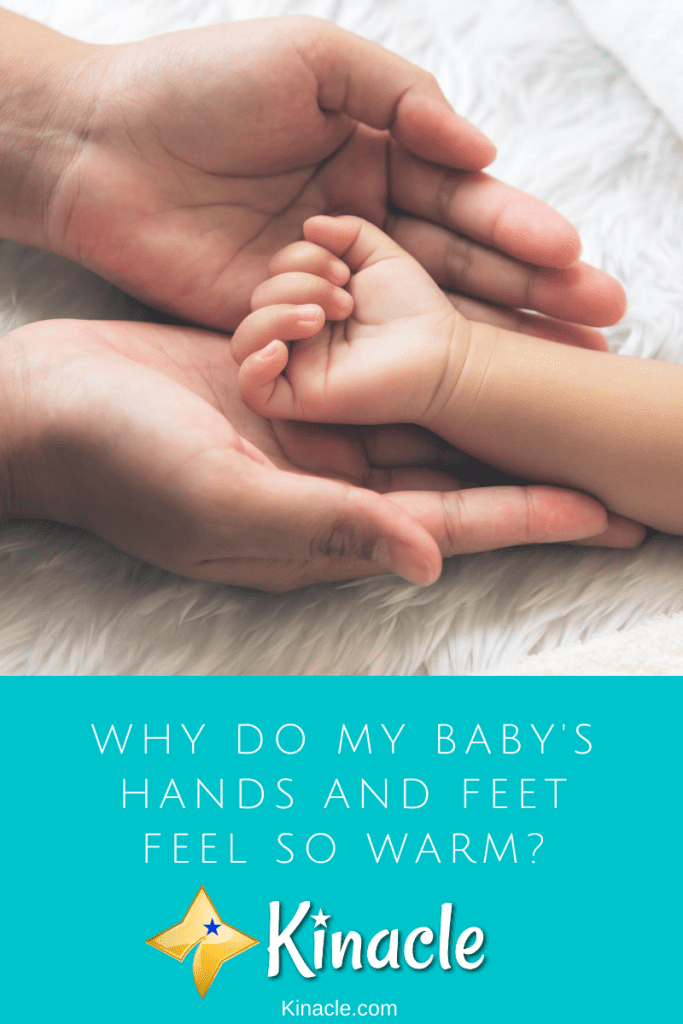
When we become parents, every little thing starts to matter a lot – especially when it concerns our baby’s health. So while you play with those tiny fingers and toes, it may seem concerning if they suddenly start to feel warm. But is it something you should be concerned about? Let’s talk about what it means when your baby’s hands or feet are warm / hot to the touch.
What does it mean if your baby has warm hands / feet?
Warm hands and feet are indicators of your baby’s normal body functions. In fact, it is one of the most important aspects of newborn assessment. The World Health Organization specified that baby’s hands and feet should feel warm upon birth. This warmth suggests that blood is freely flowing towards your baby’s extremities and a good sign of your baby’s wellbeing.
Cold and clammy hands and feet are what you actually need to be more concerned about. Cold extremities despite an ideal room temperature and clothing may indicate that blood isn’t circulating well in the limbs. In some rare instances, it may suggest serious illnesses like meningitis.
Is it normal for babies to have warm hands and feet, without a fever?
Your baby’s hands, feet and head are typically warmer than the rest of their body. According to pediatricians, it will tend to remain this way until 2 years of age. During their early years, babies can have warm hands and feet but no fever. So how can you tell if your baby has a fever or not?
Though it is typical for parents to simply touch their baby’s head, hands and feet to see if they have fever, the best way to check for your baby’s temperature is using a thermometer. According to the American Academy of Pediatrics, the normal temperature range for babies is 97 degrees Fahrenheit (F) to 100.4 degrees F. A temperature reading above the specified range can be considered as fever.
It is important to note that if your baby has a slight fever, there isn’t an immediate need to panic. Fever is usually a friendly indicator that your baby’s immune system is functioning. However, if you have a newborn that has a fever, you’ll need to seek medical attention to figure out the cause of fever and get appropriate treatment as needed.
Note that if your baby is 0-3 months old and experiencing a temperature above 100.4 degrees, or if they are 3 months and older while experiencing a temperature above 102.2 degrees, you should seek immediate medical attention.
Recommended:
[amazon box=”B0823DXJS9″]
What causes hot hands and feet in babies?
Though warm hands and feet are common to babies, there are times that the palms and soles may feel a bit hotter than the usual. This may be due to a couple of reasons:
Increased room temperature
Babies have poor temperature control and their body easily adapts to the temperature of their environment. Their soles and palms tend to get hotter as the room temperature rises and may indicate that they are feeling too warm.
Enhanced physical activity
Your baby will reach a certain age when he will love to explore his environment. They will crawl, creep, and exercise their hands and feet, resulting to more blood flow in their extremities. This may, in turn, cause more heat in the area.
Too many layers
It is very tempting to cover up your newborn with layers of clothing due to worries that they may be feeling too cold. However, newborns only need one layer more than what we would usually wear to make them feel comfortably warm. When baby has hot hands and feet, it may sometimes be an indication that you are layering your baby of too much clothes especially when they are sleeping with a swaddle. Too much layering can lead to overheating, which is not advisable for babies and increases the risk of Sudden Infant Death Syndrome (SIDS).
Other signs that your baby may be overheating include:
- Red and flushed skin
- Restlessness and discomfort
- Warm forehead
- Hot and red ears
- Unresponsiveness
Parents need to be vigilant of these signs and check their baby’s temperature accordingly. Removing unnecessary clothing and keeping your baby’s room cool and comfy can help prevent the occurrence of overheating.
Wound and infections
Some minor wounds and cuts, as well as bacterial and viral infections, may also trigger an increase in body temperature in the palms and soles of the feet, especially if the wound or infection directly involves the extremities. This is due to the nature of the immune system to fight the foreign bodies that are entering your baby’s body. The warmth will help eradicate the heat-sensitive bacteria or viruses. The increased flow of blood and antibodies is also purposed to combat the infection.
When it comes to wounds or infections, ensure that everything is treated as quickly as possible to avoid complications.
Conclusion
If your baby is experiencing warm hands and feet, this is usually a good sign that everything is working as it should be. However, if your gut feel really tells you that something is wrong with your baby, never hesitate ask your pediatrician for advice.
Disclaimer:
This article is for informational purposes only and should not be considered medical advice. Always consult with a doctor or licensed medical professional before making any medical decisions.
Leave a Reply